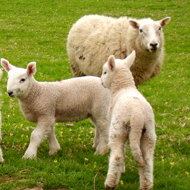Exotic disease risk on the rise

Bluetongue causes fatal infections in sheep.
Scientists are predicting that UK farmers and horse owners could be under threat from a variety of exotic diseases this summer, according to a report by Tom Heap on BBC's Countryfile programme.
Dubbed 'the quiet killer', experts are predicting that Bluetongue could return to British shores in the warmer months and, without protection, the disease could devastate livestock and parts of the rural economy.
Carried by mosquitos, Bluetongue first arrived in the UK in 2007 causing fatal infections in sheep and widespread disease in cattle. In mainland Europe, it has killed more than two million animals in the last 15 years.
Although the virus has not been seen in the UK for over four years, with farmers recovering from Schmallenberg (another virus transported by mosquitos), scientists are once again on the look out for exotic diseases.
Research by scientists at The Pirbright Institute into how rising temperatures affect the spread of mosquitos, leads them to believe that Bluetongue virus will be back on UK farms this year.
Speaking to Tom Heap, Dr Simon Carpenter from The Pirbright Institute said: "The strain which is currently circulating in central Europe is in areas which have very similar midge formation to the UK, so there's a good chance that if the virus did get here, it would spread quite rapidly."
In addition to Bluetongue, experts also believe that West Nile Virus could reach British soil this summer.
Also carried by mosquitos, West Nile Virus has the potential to cause painful illness in horses. The UK equine industry are taking the threat very seriously.
Andrew Harrison, president of the BEVA, said: "It would have a huge impact in terms of movement for the racing industry and the pleasure industry. Only 20 per cent of horses which become infected with West Nile Virus actually start to show clinical signs, such as meningitis, weakness, difficulty swallowing and collapse."
As the risk of emerging infectious diseases has risen significantly, experts say that they have to react quickly to respond to the new diseases, as well as have strategies and programmes in place to deal with the known important threats that are already out there.
Andrew added: "We don't know if it will happen, but we need to be ready if it is that is the case".



 The latest
The latest